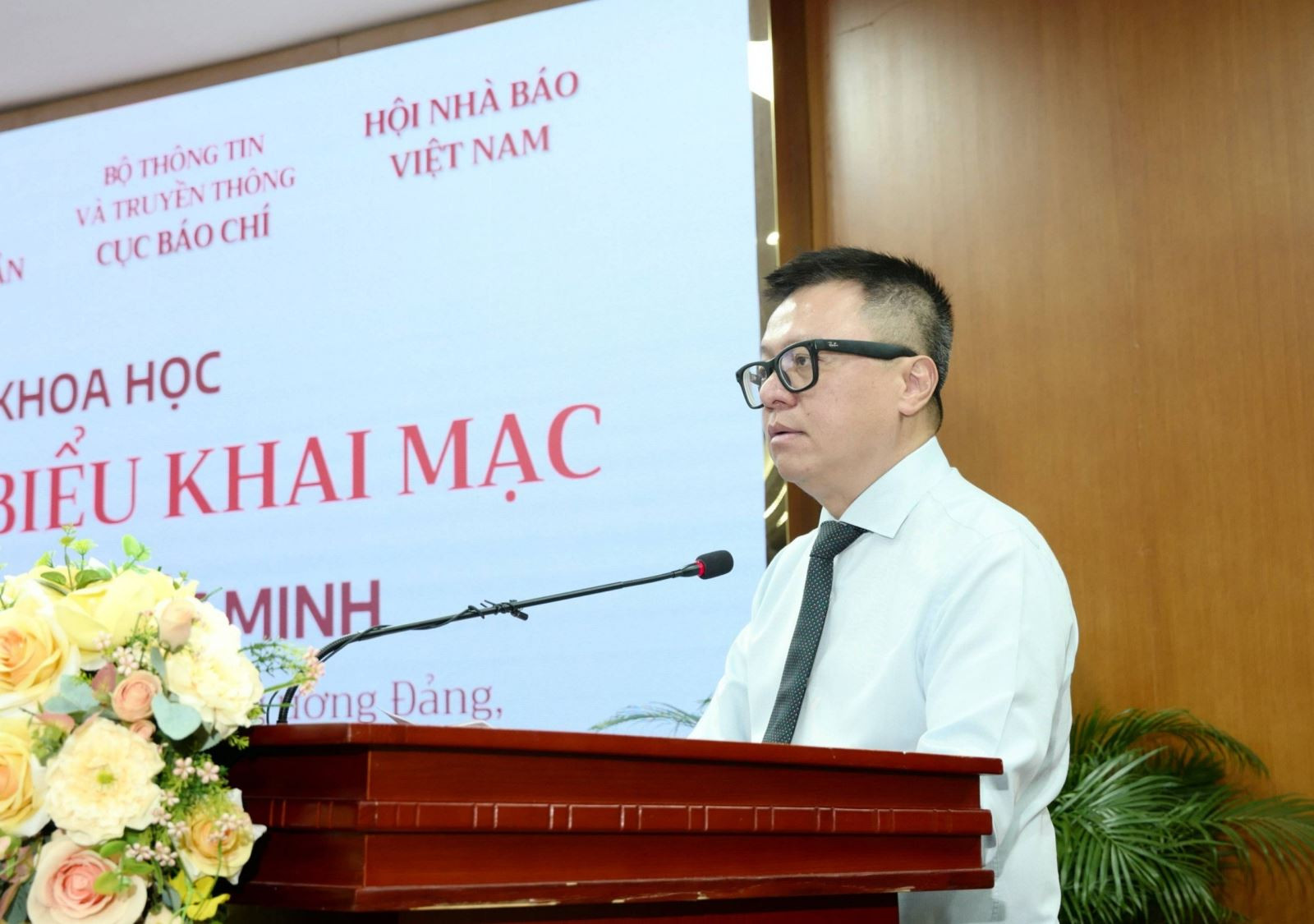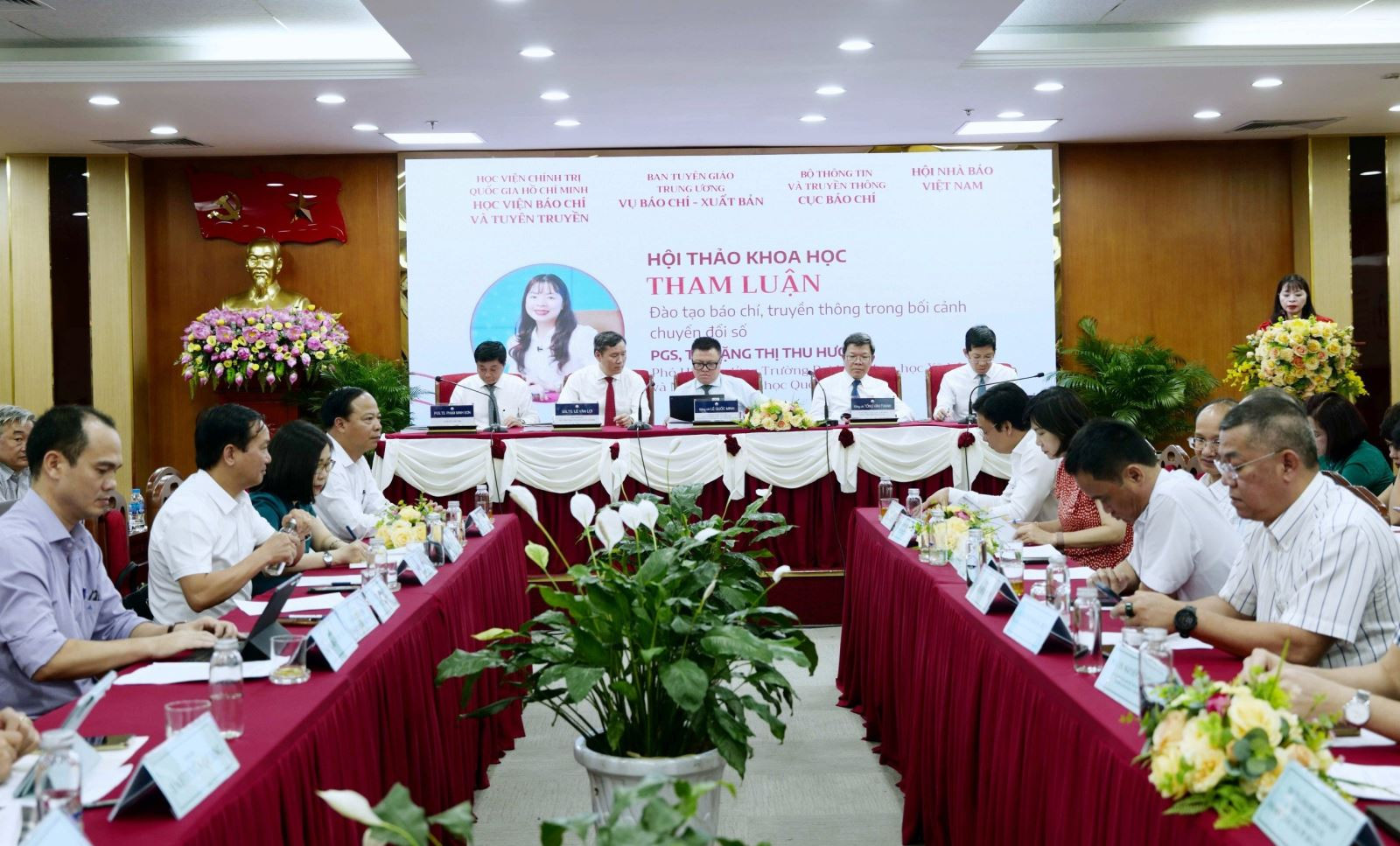On June 5, the Academy of Journalism and Communication coordinated with the Department of Journalism and Publishing (Central Propaganda Department), the Press Department (Ministry of Information and Communications), the Journalists Association and other agencies and departments to organize the National Scientific Conference "Training in journalism and communication in the current context of digital transformation".
Mr. Le Quoc Minh, Member of the Party Central Committee, Deputy Head of the Central Propaganda Department, Editor-in-Chief of Nhan Dan Newspaper, Chairman of the Vietnam Journalists Association emphasized: The Fourth Industrial Revolution is taking place strongly, with profound impacts, fundamentally changing many aspects of social life, including press and media activities. Digital transformation is no longer a choice, but a task for each press agency and media establishment, to both best and fastest serve the public's information needs, and to be consistent with the general development trend of the times, while optimizing resources for the development of the country's press and media.

Faced with the challenges and opportunities brought by the Fourth Industrial Revolution, the Prime Minister issued Decision No. 348/QD-TTg dated May 6, 2023 approving the Strategy "Digital transformation of journalism to 2025, with a vision to 2030", with the goal of "building press agencies in a professional, humane, and modern direction; fulfilling the mission of information and propaganda to serve the revolutionary cause of the Party and the cause of national innovation; ensuring the role of leading and orienting public opinion, maintaining information sovereignty in cyberspace; effectively innovating readers' experiences; creating new sources of revenue; promoting the development of the digital content industry".
Mr. Le Quoc Minh commented that digital transformation in the field of journalism and communication does not stop at promoting computerization and data digitization in journalism activities, but also comprehensively changing journalism and communication activities on the digital technology platform. Specifically: Changing the editorial management model; thinking and methods of leadership and system management; production process, content development and multi-platform journalism and communication methods; public marketing issues; data management methods, journalism and communication culture...
Therefore, in addition to the technology platform and abundant financial resources, the ability of each press and media agency to adapt to a digital future will depend on whether or not it can develop a generation of leaders, managers, and a team of press and media workers with knowledge, skills, and professional work experience in the digital environment. This is placing increasingly higher demands and requirements on current press and media training, in order to keep up with the general development trend and promptly meet the demand for high-quality human resources for society in the context of digital transformation.
In the current context, training and fostering continue to play an important role in realizing the goal of building a digital press and media industry in our country. “This has been affirmed in the Strategy "Digital transformation of journalism to 2025, with a vision to 2030", when the Government set the goal of "100% of higher education institutions specializing in journalism or having journalism faculties update knowledge and skills in the digital journalism environment in the training program for students; 100% of leaders, officers, reporters, and editors of press agencies are trained and fostered in knowledge and skills in digital journalism transformation", Mr. Le Quoc Minh emphasized.

In fact, in recent times, journalism and communication training institutions have promptly integrated and included digital transformation content into their training and development programs; at the same time, they have regularly updated, supplemented, adjusted, and perfected the framework programs and detailed programs of each major, in accordance with the requirements and demands of practice.
Schools have also focused on innovating thinking and training methods in a modern, synchronous direction, combining theory and practice, theoretical teaching and practical guidance; equipping learners with necessary knowledge and working skills in the digital environment, bringing digital newsroom models, virtual studios, new generation media technology... into classrooms; along with that, fostering and improving political qualities, qualities, pure professional ethics, dedication, impartiality, objectivity in performing tasks, always putting the interests of the Party, the Fatherland, and the people first.
However, the current digital transformation context requires journalism and media training institutions to redefine their training philosophy and goals in line with new trends; and promptly develop a national standard curriculum framework for journalism and media training, in line with the requirements and tasks in the new situation.
These are new challenges for journalism and media training in the country, especially in the context of training quality in some places not meeting requirements or slow innovation in methods, investment in facilities and resources, and building separate mechanisms for journalism and media training still having many shortcomings and shortages...
Within the framework of the program, delegates who are leaders of units under the Vietnam Journalists Association, leaders of press agencies, and scientists shared many valuable presentations and participated in roundtable discussions to research, grasp, discuss, and propose solutions and recommendations to continue improving the quality of journalism and media training to meet the requirements of digital transformation in Vietnam in the coming time.
Delegates expressed agreement with some opinions that the new media environment, especially the digital transformation of journalism, requires a new mechanism for training and fostering journalists. New media have many features, including text, sound, and images, and are a synthesis of all traditional media. For today's digital journalists, they must know how to apply new media techniques, know how to film, write, and process sound and images, and at the same time grasp modern information techniques such as Skype, MSN, blogs, Podcasting, etc. Therefore, the requirement for journalism training needs to be strongly improved, both scientific and systematic... to adapt to the needs of the media in the process of innovation, thereby training a team of professional digital journalists, suitable for the needs of development and digital transformation of journalism today.